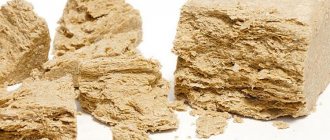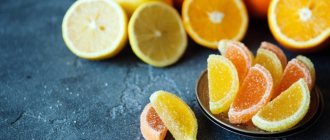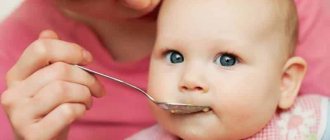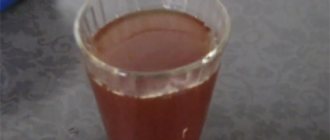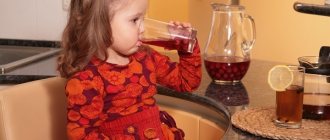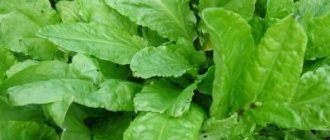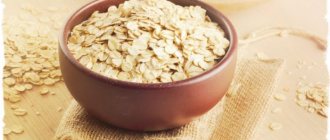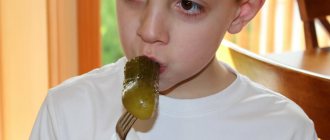The benefits of honey for children's health
- reduces the risk of scoliosis, helps the absorption of calcium during the formation of the child’s skeletal system;
- increases hemoglobin levels, improves blood composition, prevents the development of anemia;
- activates the baby’s digestive system, accelerates the absorption of proteins and fats;
- improves vision. honey contains thiamine, ascorbic acid and carotene. They help develop the functions of the visual system;
- increases immunity, reduces the risk of developing viral diseases;
- has an antifungal, antiseptic effect, used in the treatment of candidiasis and sore throat in children;
- weakens coughing attacks, improves the condition of patients with sore throat and bronchitis;
- calms, relieves increased excitability.
Is it possible to give honey to an infant?
Doctors are unanimous: children under one year of age should not be given honey!
Contraindications are based on the high risk of allergies and botulism infection. In addition, honey contains fructose, and therefore, when consuming a sweet product, infants may be predisposed to diabetes.
Mothers who are breastfeeding should also limit their intake of sweets, because the baby reacts to all the components that enter its body with mother's milk.
Contraindications
The consumption of honey is contraindicated for children suffering from diseases of the digestive system and metabolic disorders. It should not be given to a child who has diabetes, a tendency to be overweight, or a hereditary predisposition to diathesis and allergies.
Honey is dangerous for young children because it may contain bacteria that produce botulism toxins. Consuming honey can cause extremely dangerous food poisoning in an infant, often leading to death.
Frequent consumption of honey can lead to the development of caries and excess weight gain.
Is it possible to give honey to 1, 2 and 3 years old?
Should I give honey to children under 3 years of age? Or include it in food no earlier than 6 years? Scientists have found that consuming honey at an early age is beneficial, but it is important not to exceed the norm and take into account the individual characteristics of the body.
A baby over a year old, if he does not have allergic reactions, should be gradually introduced to healthy treats and liquid nectar should be introduced into drinks and cereals. For example, a one-year-old child can be given a taste of warm milk or cottage cheese with a small amount of nectar. You should start with half a teaspoon a day.
Children aged 2 years are given up to 20 grams of honey per day (one teaspoon). In this case, the portion is distributed into two or three doses, depending on the time of day. Children 3-5 years old can take up to 30 grams of honey per day.
If you are in doubt at what age you can give your child honey without risk to his health, consult your doctor.
Honey for babies
Is it possible to give honey to an infant? Here the opinions of pediatricians agree - honey delicacy is strictly prohibited for consumption in infancy.
The fact is that this product contains spore-forming bacilli, which, penetrating the infant’s digestive system, help create favorable conditions for botulism. These spores can also cause intoxication and death.
In addition to the circumstances listed above, honey is prohibited for consumption, as it can provoke the development of allergic reactions. It is a fairly concentrated biologically active substance, which the baby’s body is not able to absorb normally.
How much honey can school-age children eat?
For preschoolers, the daily dose of honey is increased to 40 grams (two teaspoons). Younger schoolchildren (from 6 to 9 years old) are recommended to eat no more than 60 grams per day.
Pediatricians note the benefits of honey for the mental development of a child, but pay attention to compliance with dosages: for children over 10 years old, no more than 80 grams can be recommended.
!Important to know : a large amount of the product and its uncontrolled use will harm your child’s health.
Is it possible to give honey to a child every day?
When answering the question about daily consumption of honey, doctors' opinions were divided. Most specialists adhere to an individual approach, the need to control age-specific dosages of the product and monitor the child’s health.
What can you give honey with?
There are different options for using honey. Some people prefer it in its pure form, others use it as an additive to cereals and drinks.
Popular recipes:
- drink with honey and lemon. Warm water with a spoon of honey and a slice of lemon will saturate the body with energy and increase protective functions;
- baked apples with cottage cheese and honey. A tasty and healthy breakfast: the core is removed from the apple, the fruit is filled with cottage cheese and baked in the oven. Drizzle with honey before serving. This technique helps preserve the beneficial properties of nectar;
- pasta with nuts. An excellent option for a healthy snack: crushed nuts are mixed with honey and used for sandwiches with grain bread.
The need for honey in childhood
Children need a sweet product for growth and development.
Infancy
Honey is contraindicated for babies. The digestive system does not yet produce the enzymes necessary for proper digestion. Newborns should not take honey because the reaction is unpredictable, allergies often develop, and the functioning of the gastrointestinal tract is disrupted.
One year or older
Honey is allowed for children over one year old according to Dr. Komarovsky, but many pediatricians recommend avoiding its use: the likelihood of developing allergies and other undesirable reactions at this age is too high.
If the body reacts normally to the product, eating honey will be beneficial. The child will receive many vitamins and minerals necessary for proper development. The nervous system is strengthened, the immune system becomes stronger.
After two
At 2 years old, you can give children more honey. It is recommended to replace industrial desserts, which contain sugar, large amounts of fat, and artificial additives, with healthy treats. This will help not only reduce the caloric content of the diet, but also avoid the development of sugar addiction in the child, and prevent the negative consequences of consuming harmful impurities.
The child will get sick less often. In case of illness, a small dosage of natural medicine will speed up recovery and prevent the development of dangerous complications.
Honey and three year olds
Children from three years of age require a large amount of nutrients: at this age, the child is actively exploring the world and often needs additional immune protection, since breast milk is completely eliminated from the diet and the antibodies it contains stop entering the body. Honey will help make the immune system stronger and supply the body with the substances necessary for proper development.
Preschool and primary school age
Preschoolers and primary schoolchildren are in active contact with other children, which increases the risk of infection. It is necessary to further strengthen the immune system. Consuming honey will be beneficial. In addition, the child needs to increase the intake of vitamins and microelements to ensure better brain functioning and enhance cognitive functions.
Contraindications, why and when you should not give honey to children
So, if parents decide to include a natural product in their child’s diet, they need to follow certain rules:
- Before you start giving honey, you must make sure that it is of high quality;
- For the first dose, choose only liquid nectars, adding them to a warm drink (kefir, milk). You should not offer your baby honeycombs;
- do not heat or add it to hot food;
- Children should not consume honey if they have signs of diabetes;
- to preserve tooth enamel, teach your child to rinse his mouth with warm water after each sweet treat;
- after taking honey for a month, you should take a break for a couple of weeks;
!Important to know : temperatures above 45ᵒC destroy the beneficial properties of the product
How does an allergy to honey manifest itself and what to do?
You will immediately see signs of an allergy in a child: hives and diathesis on the limbs, abdomen, and face signal a reaction from a fragile organism. Self-medication in this case is unacceptable! We recommend consulting a doctor to avoid more serious consequences, including anaphylactic shock.
Benefits of consumption
It is no secret that it serves as a rich source of microelements, allowing you to fight diseases. However, it is necessary to consider the picture of what is happening objectively, without treating serious ARVI diseases with it (sore throat, bronchitis, mononucleosis, etc.). Honey should not be given as the only treatment. In this case, more complex therapy will be required. Perhaps with being in the infectious diseases department of a city or regional hospital and taking antibiotics.
How honey is beneficial for babies when consumed:
- has the status of an immunomodulator, immunostimulant;
- has a beneficial effect on the gastrointestinal tract, since it is absorbed 100 percent (which is extremely unique for food products);
- has a beneficial effect on the nervous system (based on the principle of all sweets, which improve mood through the growth of endorphins);
- contains sugar, which is less harmful than white sugar;
- And so on.
The topic of “at what age can you give” fades into the background here. Usefulness in the absence of restrictions is revealed at any age. You will first need to determine whether honey can be given to a child at all. This is an objective question for all sensible parents of small children and grown-up sons and daughters.
How to choose honey for a child
When choosing honey, you need to pay special attention to the quality of the product. If you purchase a product from private sellers, check its naturalness using available methods, assessing the appearance, taste and smell. Detailed step-by-step instructions on how to check a product are here.
You can avoid deception and counterfeiting by shopping for healthy products in well-known online stores or large chains. Sellers who care about their reputation will present certificates and provide full information about the composition, place and timing of product collection, packaging and storage dates.
How to properly store honey
To preserve the beneficial properties of the product, you need to follow simple rules:
- temperature and humidity . The optimal storage mode is from 5ᵒС to 20ᵒС. You can choose a dedicated refrigerator shelf or a dark, cool pantry. Avoid bright light, high humidity and proximity to foods that have a strong aroma (spices, for example);
- Tara . Clay, plastic or glass containers with tight-fitting lids are ideal for storing honey. Mandatory condition: containers must be clean and dry. In a damp container, the biologically active product will begin to “play” and ferment. Not only the taste and aroma of natural nectar, but also the unique qualities of the product will quickly disappear;
- Deadlines . High-quality natural honey can be stored for up to 18 months if the above rules are followed. Do not exceed this period: during long-term storage, the beneficial properties of the product are lost.
Read about the types of honey, its use in cooking, medicine and cosmetology on the pages of our blog. The Royal Forest online store team wishes you health!
